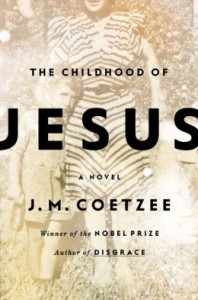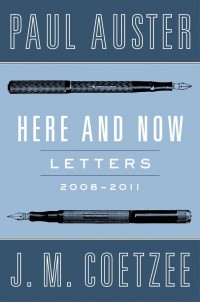The Childhood of Jesus
 The Childhood of Jesus
The Childhood of Jesus
by J. M. Coetzee
Viking, Sept 2013
288 pages / $26.95 Buy from Amazon
As someone who has recently come to Australia, I find the reviews of Coetzee’s latest novel astounding. His early novels Life and Times of Michael K and Waiting for the Barbarians had readers and reviewers inferring the novels’ South African racial and historical specificities, with neither being identified in the books. Reviewers of The Childhood of Jesus, however, have mainly commented on the novels’ insular, literary and ageographical nature. Some reviewers have even gone so far as to say the novel is set in “an entirely Coetzeean universe” or a ‘Novel-land.’ Strangely, there has been an appalling lack of recognition of the book’s Australian context.
Reviews of most of Coetzee’s novels since he emigrated from South Africa to Australia have taken a similar tack. Many reviewers and critics have viewed his departure from Africa as being a departure from his usual themes of postcolonialism, nation and race. Coetzee’s speech given upon receiving citizenship seems to contradict this, with him saying very publically that in “becoming a citizen one undertakes certain duties and responsibilities.”
The Childhood of Jesus tells the story of middle-aged man, Simón, and young boy, David, who arrive by boat as immigrants in a Spanish-speaking country. Somehow in his previous life David lost his mother and on the journey to their new life Simòn vowed to help the child find her. Helped by the usual Coetzeean/Kafkan bureaucratic nightmare, the pair find accommodation, work and friends. In this new world, everyone seems to be an immigrant arriving by boat and none of them speak about their old lives.
Eventually Simòn finds a mother of sorts, Inés, for David and entrusts the boy to her care. Simòn continues to be heavily involved in the boy’s life and acts as a kind of teacher to him. David however is not a willing student and has entirely novel ideas on mathematics and language, getting him in trouble with school and eventually the state.
Reading Childhood during an election period shortly after I arrived in Australia may have made me more keenly aware of the novel’s Australianess. I appear to be almost alone in this thought though. After trawling through pages of reviews, I was staggered at the lack of writers connecting the novel to Australia’s current political and sociological position. A few reviews make the connection briefly but swiftly move onto discuss Coetzee’s high philosophical ideas.
One of the biggest areas of debate in past years in Australian politics has been the so-called “boat people”. Numbers of refugees arriving in Australian illegally by boat have dramatically risen in recent years – although the numbers are not big enough to warrant the size of the debate. Many of these are ethnic Hazaras fleeing Afghanistan (a country that Australia has a military presence in).
“Family reunions” is another hot topic in Australian politics. This is where refugees who are already within Australia apply to have their family members who have not yet escaped their country join them in Australia.
October 14th, 2013 / 11:00 am
25 Points: Here and Now: Letters (2008-2011)
 Here and Now: Letters 2008-2011
Here and Now: Letters 2008-2011
by Paul Auster and J.M. Coetzee
Viking, 2013
248 pages / $27.95 buy from Amazon
1. As the title suggests, this book documents the correspondence between Asturias Prize winner Paul Auster and Nobel Prize winner J.M. Coetzee from 2008-2011.
2. According to my calculations there are 79 letters, though some letters include emails explaining a fax machine is broken or low on ink.
3. It is not revealed if either titan of world literature had to dial a 9 before faxing.
4. There is no editor’s note, introduction, epilogue or index. Peculiar for a book of letters. There are footnotes but only sometimes: a biography of Kafka is footnoted while Pierre Clastres’ Chronicle of the Guayaki Indians is not.
5. 11 letters were exchanged in 2008, 30 in 2009, 25 in 2010 and 13 in 2011. The 2008 and 2011 exchanges are high-spirited, covering topics ranging from why men enjoy watching sports to the film director William Wyler.
6. On the 24th letter they perfect their flow: “Thank you for yesterday’s fax. I feel that we have finally hit upon a workable system. A slow letter across the seas from America to Australia and then a quick, electronic transmission of paper from a room in a house in Adelaide to a room in a house in Brooklyn.”
7. I would’ve liked to have been a fly on the whiteboard when Viking Press gave the green light to the title. I could’ve squashed myself.
8. Coetzee is why I wanted to read this book. I thought I’d never read a book by Auster. Halfway through I realized I have read several of his books, years ago, but I still don’t remember reading them. Is not reading a book and not remembering reading a book the same thing? Scrolling for Auster I found James Wood’s mean-spirited article from 2009. Whenever James Wood decides someone is a bad writer they deserve a closer look.
9. “The emboldened critic,” Coetzee says in letter 42, “becomes like the child lobbing pebbles at the gorilla in the zoo, knowing he is protected by the bars.” Auster on James Wood: “I mustn’t complain, least of all about a man whose name suggests that one day he will be eaten by termites.”
10. This book made me miss my grandfathers. READ MORE >
April 11th, 2013 / 12:00 pm
Dept. of Arbitraryish Statistics: Three Variations on Three-Act Structure Edition
Coetzee, J.M. Disgrace. New York: Viking, 1999.
Acts: 3.
Chapters: 24.
Chapters per Act: 8.
Pages per Chapter: 8-10. READ MORE >
November 22nd, 2010 / 2:05 am

